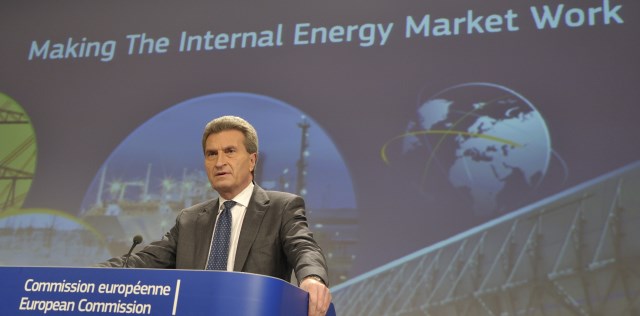EU Energy Commissioner Günther Oettinger says Germany must review its Renewable Energy Act (EEG) immediately after the elections in September. He specifically has his eye on priority grid access for renewables. But Craig Morris says there is always “too much” renewable power for power firms.

In November 2012 Günther Oettinger presented the Commission’s position on how to restructure the internal energy market, which could impact and limit the design of renewable support schemes in all member states. (© European Union, 2013)
A few weeks ago, there was word that Brussels wanted to look into the exceptions to the renewables surcharge and the grid fee that Germany grants to energy-intensive industry. Then, Brussels announced that investigations would not start until the fall, probably to give Chancellor Merkel time to create a new coalition after the September elections (further evidence that the current coalition is at a logjam). Now, Oettinger says the newly elected coalition should quickly review the entire EEG before Brussels steps in.
What’s the problem? When talking about Germany’s progress with renewables, international onlookers have focused almost exclusively on the level of feed-in tariffs – how much Germany pays for renewable power. But the law itself, the EEG, is actually called the Act on Granting Priority to Renewable Energy Sources (here’s the official translation, PDF).
Basically, all renewable electricity has to be bought. Admittedly, there are exceptions, where power lines cannot take up all of the electricity generated, but as of 2011 we were only talking about far less than 1% of total wind power. And because solar power production largely coincides with power demand, the issue is less critical with solar anyway (aside from the possibility of individuals lines being overloaded). Biomass units are dispatchable, so they can simply be ramped down. The issue seems to have died down for wind power since 2011, for I have not seen a discussion or any figures for 2012 (but feel free to use the comment box if I have missed something).
Oettinger is thus not concerned about Germans having to pay for a lot of renewable power not used. Rather, green electricity is doing what the conventional power sector long said was impossible: offsetting demand for fossil and nuclear power. As a result, conventional plants are running at lower capacity – and making lower profits.
The standard criticism is that Germany is paying top dollar for renewables regardless of whether the power is needed at a given moment, and the result is unprofitability for dispatchable capacity, which Germany will always need; for the time being, it is fossil and nuclear, but one day it, too, could be renewable, such as syngas.
But we need to be careful – the one thing that can bring the energy transition to a halt is revoking priority access. Power companies will then simply claim (correctly) that they do not need the power; they may not, but the energy transition does. One reason Ontario did not go further with its feed-in tariffs (FITs), despite the attractive pricing, was because priority grid access was not always a given.
Spain’s FIT+bonus system might be a good compromise. Basically, years ago the Spanish implemented a low FIT designed to cover costs, but not provide a profit. Power is sold on the grid, so profitability depends on whether the electricity is needed when it is generated.
This model could be an incentive for power storage and virtual power plants. If properly designed, Oettinger’s proposal could help shape a future market that would facilitate the energy transition. If poorly designed, it would allow large utilities to refuse to purchase green power if they can argue that they didn’t need it at that time. The energy transition would then come to a screeching halt.
Craig Morris (@PPchef) is the lead author of German Energy Transition. He directs Petite Planète and is writes every workday for Renewables International.
How about we call for an end to Günther Oettinger as EU Energy Commissioner. The guy has proven to have little insight into where things are headed.